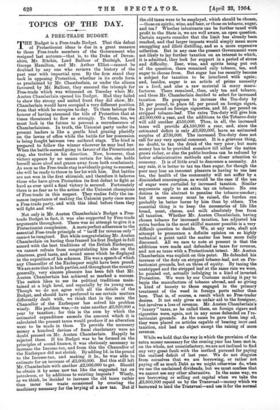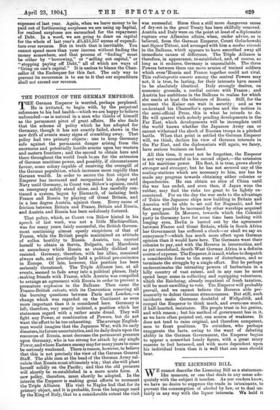A FREE-TRADE BUDGET. it is admitted, they look for support
in a period of stress and difficulty. Beer, wine, and spirits being put out
THE Budget is a Free-trade Budget. That this defeat of Protectionist ideas is due in a great measure to those Free-trade members of the Government who resigned last autumn—that is, to the Duke of Devon- shire, Mr. Ritchie, Lord Balfour of Burleigb, Lord George Hamilton, and Mr. Arthur Elliot—cannot be doubted by any one who reviews the history of the past year with impartial eyes. By the firm stand they took in opposing Protection, whether in its crude form as proclaimed by Mr. Chamberlain, or under the aliases favoured by Mr. Balfour, they ensured the triumph for Free-trade which was witnessed on Tuesday when Mr. Austen Chamberlain opened his Budget. Had they failed to show the strong and united front they did show, Mr. Chamberlain would have occupied a very different position from that which he occupies to-day. To them belongs the honour of having stemmed the tide of Protection that at times threatened to flow so strongly. To them, too, we must look in the future to prevent a recrudescence of Chamberlainism. In truth, the Unionist party under its present leaders is like a gentle hind grazing placidly on the lawns of office while the battle for her possession is being fought between two antlered stags. The hind is prepared to follow the winner wherever he may lead her. When the battle seemed going in favour of the Protectionist stag, she trotted in his direction. Now, however, that victory appears by no means certain for him, she holds herself more aloof and grazes away from both combatants. As soon' as the Free-trade stag is evidently going to succeed, she will be ready to throw in her lot with him. But battles are not won in the first skirmish, and therefore it behoves those who have given Protection its first defeat to fight as hard as ever until a final victory is secured. Fortunately there is no fear as to the action of the Unionist champions of Free-trade in this respect. They realise fully the im- mense importance of making the Unionist party once more a Free-trade party, and with this ideal before them they will fight and win.
Not only is Mr. Austen Chamberlain's Budget a Free- trade Budget in fact, it was also supported by Free-trade arguments throughout. There was no attempt to give it a Protectionist complexion. A more perfect adherence to the essential Free-trade principle of " tariff for revenue only " cannot be imagined. But while congratulating Mr. Austen Chamberlain on having thus framed his first Budget in full accord with the best traditions of the British Exchequer, we cannot refrain from congratulating him also on the clearness, good taste, and sound sense which he displayed in the exposition of his schemes. His was a speech of which any Chancellor of the Exchequer might have been proud. We are sure that in both parties, and throughout the country generally, very sincere pleasure has been felt that Mr. Austen Chamberlain has achieved so marked a success. The nation likes to see its political traditions main- tained at a high level, and especially by its young men. Though we do not agree with all the details of the Budget, and should have preferred to see certain matters differently dealt with, we think that in the main the Chancellor of the Exchequer has solved his problem wisely. His problem was,—to raise another £3,820,000 a year by taxation ; for this is the sum by which the estimated expenditure exceeds the amount which it is calculated the present taxes would produce if no alteration were to be made in them. To provide the necessary money a hundred devices of fiscal charlatanry were no doubt pressed on Mr. Austen Chamberlain. Happily he rejected them. If his Budget was to be formed on the priuciples of sound finance, it was obviously necessary to increase the Income-tax, and from this the Chancellor of the Exchequer did not shrink. By adding ld. in the pound to the Income-tax, and making it Is., he was able to estimate for an increase of £2,000,000. But this still left Mr. Chamberlain with another £2,000,000 to get. Should he obtain it by some new tax like the suggested tax on petroleum, or by additions to existing imposts P Wisely, as we think, he decided to increase the old taxes rather than incur the waste occasioned by creating the machinery necessary for the levying of a new tax. But if
While we hold that the way in which the provision of the extra money necessary for the coming year has been met is, on the whole, not unsatisfactory, we are not inclined to find any very great fault with the method pursued for paying the realised deficit of last year. We do not disguise from ourselves that we are borrowing, or rather not paying off as much Debt as we might otherwise do, when we use the unclaimed dividends, but we must confess that we cannot see any other alternative. In the same way, we are borrowing or selling out capital when we take the £3,000,000 repaid us by the Transvaal—money which we borrorted to lend the Transvaal—and use it for the normal expenses of last year. Again, when we leave money to be paid out of forthcoming surpluses we are using up bapital, for realised surpluses are earmarked for the repayment of Debt. In a word, we are going to draw on capital for the whole of last year's 45,415,557 excess of expendi- ture over revenue. But in truth that is inevitable. You cannot spend more than your income without finding the money somewhere, and that process of "finding" must be either by " borrowing," or " selling out capital," or "stopping paying off Debt," all of which are wave of "living on ones i s capital." It is useless to blame the Ohan- cellor of the Exchequer for this fact. The only way to prevent its recurrence is to see to it that our expenditure shall not exceed our revenue.
THE POSITION OF 1111, GERMAN EMPEROR.











































 Previous page
Previous page